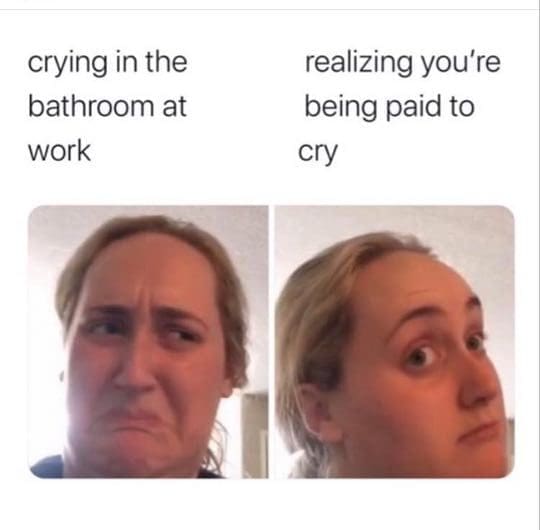It’s our working life and we’ll cry if we want to. Our stories of trying to keep it together at work – and the reasons why you shouldn’t.
Alice
Growing up, everything I saw on television and in movies – including watching Tom Hanks in A League of Their Own howl, “There’s no crying in baseball!!” way too many times – taught me that crying at work was both a very unprofessional and deeply embarrassing thing to do.
So when I entered the workforce, I avoided it. At all costs.
When I got made redundant, I stayed stoic and waited until I was on the bus home to let my tears fall. When my boyfriend broke up with me I spent a week keeping it together at work, then walking to the downtown mall on my lunchbreak to cry in the bathrooms where I could put in eye drops, redo my makeup and pretend that I was okay again for the afternoon.
It took years before I realised that crying is a very normal human response and any boss worth their salt, who has professionalism and some semblance of an empathy chip, would agree and not recoil in horror or shame at the sight of a few tears.
I was lucky that after a few years I had a boss who modelled what to do when someone is crying, incredibly well. She had both a no-nonsense attitude, and a well-honed sense of empathy. When I heard that her marriage had come to an abrupt end, I sought her out, wanting to let her know that I knew and show her my support.
She immediately reached out for a hug, got teary and I got teary. Her attitude was that crying is a part of life – we all had lives outside of the office, and inevitably, things would happen that would make us cry. It was a part of life – no need to be embarrassed, apologise, or make a fuss.
When my longterm relationship ended a couple of years later, she walked into my office to tell me something and I immediately burst into tears. Normally, I would have been mortified, but it didn’t even occur to me to be.
Sadly, not every boss has been the same. Some have been deeply uncomfortable, dismissive, or strangely defensive at the sight of my tears.
Personally, I’m pretty good at crying – particularly if I’m talking to someone and they start crying. I’ll nearly always well up myself too. I worried for a while that this might make me seem unhinged in the workplace. But it’s happened a few times – and it’s only seemed to make the situation better.
I’ve pointed it out while I’ve looked for tissues and tried to say something along the lines of, “Now I’m tearing up too! I can see this is something you really care about/or are finding difficult. If you’d like to pause, we definitely can – or would you prefer to keep going? I have all the time in the world to talk.” I’ve always liked to give people the option to stop the conversation OR continue, because when I’ve cried and my boss has either pretended my tears aren’t happening, OR just shut down the conversation it’s always left me feeling frustrated – like I’ve done something wrong that I should be embarrassed about. Or I’m clearly crazy and need a time-out.
I spoke to a body language expert once about the fact I often get teary myself when someone else cried and she said it was actually very common. In fact, she said it can be a fear of triggering that response that can actually make some people immediately feel very uncomfortable when someone starts crying at work.
Now, I think it’s just something that happens and it’s only as big of a deal as you make it. I’ve seen many people cry at work – sometimes it’s unrelated to the job and something has happened in their personal life – other times it’s directly about the job or a situation at work. It normally happens because they care a great deal, or are feeling completely frustrated, or totally overwhelmed. That’s important to be acknowledged!
Our tears can tell us so much. In the last few years at work I cried more than I had all of the other years put together. I’d feel so under the pump, so overwhelmed and under so much pressure, sometimes I’d just need a release. A few times I’d go to my car, just to sit in it in the darkness and have a cry. Other times, I’d seek out one of the great people I worked with – who just happen to now be the ladies of Capsule! – and let it out to them.
I think a good rule of thumb for me to remember moving forward though is, if you’re having to routinely retreat to your car for a cry – your job might not be all it cracked up to be. And, if someone takes issue with you crying – well, it really says a lot more about them, than it does you.

Nicky
During my London years I worked for a formidably talented but extremely temperamental boss who would fly into rages when things didn’t result in her desired outcome. At the end of each of these unpredictable tirades it was not uncommon for the person on the receiving end to wind up in tears.
Mostly the verbal abuse was evenly distributed around staff members but I’ll never forget one painful dressing down that I received. Failing to answer my boss’ phone while she was in a meeting (because I couldn’t find it in her handbag and didn’t know whether she wanted me to rummage around) she stormed over, tipped her entire bag out in front of me so the contents fell at my feet and shouted at me to “use common sense”, a phrase I have since come to hate.
Friends, I could do nothing but apologise meekly then head to the toilets to weep. I felt angry and embarrassed and hopelessly trapped in a job with a scary person. When I watched the Devil Wears Prada a few years later it gave me painful flashbacks.
In hindsight I can see that she was a person under a lot of pressure with no good skills for coping with that. She was unable to accept that the people who worked for her were only human and could not intuit her every whim and, as a result, she could not stop herself from lashing out. Because I was quite young, however, and still developing my professional confidence it hit pretty hard at the time. I wondered if I just wasn’t smart or capable enough to make it in the big, bad working world.
Turns out, of course, that I could and the longer you carry on the more you learn what’s you and what’s someone elses baggage and how to separate things out.
In the years since then, I’ve also become a manager and I’ve tried my best to be friendly and kind and recognise that we all have good days and bad. Never once have I tipped my bag out. Maybe at times I haven’t been tough enough. I know there have been mornings where I’ve conducted furious one way arguments in the shower and then piped up with nothing when it came to the crunch.
I also know that there have been moments where I have snapped at people unfairly because I was feeling overworked or anxious and they happened to be nearby.
That’s what happens when you’re thrown into a high pressure environment with a bunch of people for 40 hours a week. You’re going to see each other at your best and your worst no matter how hard everyone tries to hold it together. Some days the tears will fall.
And while the occasional losing of one’s shit is simply inevitable, the real issue is whether we have the courage to apologise afterwards. The power of an unreserved ‘I’m sorry’ will go a hell of a long way in any kind of relationship. It does not, as some people may falsely believe, diminish power but instead, I’ve always found, confers a great deal of respect. Because after all, we’re all just humans.


Kelly
God, the amount of times I’ve cried at work is actually quite embarrassing.
So many things would get me going. I have this thing where I cry when people are being too nice, or if something amazing happens, or if someone is really happy – you know that Lotto ad where the lady thinks she’s lost her winning ticket, but when she gets her cast off, the ER nurse had plastered it in? Every damn time.
But if something has upset me I’ll do everything in my power to stop the tears from falling. In my head, I imagine a brick wall between me and my tears, and focus on building a brick at a time until the tears and emotions are hidden and contained.
Unfortunately in the last few months of my last job when everything was going to hell in a handbasket, it was a little difficult.
Alice is right – the tone of a workplace is very much set by its leaders – and thankfully for me, Alice was my last boss! She and I developed a handy little code for when we needed a bit of time out from the office where we could retreat to a hidden corner of the inner city complex where we worked and just have a good old bawl about whatever was upsetting us.
In hindsight, a magazine office filled with more than 200+ women should have been the perfect place for the odd cry – not to be stereotypical but there were a whole heap of estrogen-filled emotions being constantly flung around that building – but it wasn’t. Not a week would go past without spotting some poor chook standing in the stairwell, facing the corner and trying to hide her trembling shoulders and the sounds of her sniffles, or walking into the bathroom, seeing someone in full meltdown and either try to help, or turn around and walk out again to try and give them a squidge of privacy.
I remember one time after a particularly painful breakup, I’d spent the entire morning bawling over my coffee at the cafe next to my work, then making my way back to my desk and trying to hide the now free-flow of tears as I proof read a story, only to pick up the page and have the soggy paper disintegrate in my hands which made me howl even more before I admitted defeat and ran off to the bathroom.
I don’t know why we’re ashamed of crying. The New York Times did a survey with Chief Financial Officers in the US, and 75% of them reckoned crying at work is normal. We need to cry as humans in order to experience catharsis – but although women tend to cry more than men, we actually feel worse after doing it. Men, on the other hand, feel better. Classic. But of course – we don’t need anything else going against us in the workplace.
If there’s ever a year to let it out at your desk though, surely 2020’s it.


Emma
Whatever the opposite of a poker face is, that’s what my face is. I cannot hide my emotions, ever. Also, I cry all the time. I cried twice in Hustlers. I’ll probably cry before the end of this sentence. But as a ***creative***, I actually found my overactive tear ducts to be a useful sign while writing. If something made me emotional, it usually meant I was on the right track. If I cried a lot, it was a good sign. If I had to lock myself in the bathroom and really let it out, it was a really good sign.
There were very many stories over the years that made me cry and luckily, I worked with very understanding people who would let me get away with just saying “allergies” and pretending to cough into my elbow. A couple of years ago, I went through a bad break-up where I had to schedule cry breaks before, during and after work in order to appear like a functioning human for the majority of the working day. As a result of this break-up, I got to go on a women’s retreat in Bali – yes, print media was not without its perks! – on the understanding that I would write a story about it. Luckily, the words poured forth just as freely as my emotions and it was the first story I had written about myself, which was a bit confronting.
I have always abided by the quote: ‘what is most personal is most universal’ and that, actually, the material that is the hardest to write is the best to read. I emailed the copy to my editor and then wordlessly got up from my desk for my Scheduled Afternoon Cry. When I returned, my editor – knowing me well and having the best heart in the world – refused to look at me directly in the eye as she gave me lovely feedback. It remains one of the stories I’m proudest of.
The second to last story I ever wrote for my old job was about Farid Ahmed, a survivor of the March 15 shootings, whose beloved wife Husna died in the attacks. I visited Farid in his home and together, we both visited Al Noor mosque, where so many Kiwis died. Farid was lovely, softly spoken and funny. After coming back from the mosque, we sat in his lounge where he told me about his wife. I pinched the inside of my arm repeatedly, trying to keep myself in check. It worked well for the first third of the interview. And then he cried, and I cried.
I’m never sure what the etiquette is for journalists – crying never feels professional, but god, sometimes it is all you can do. You cry as a human because your heart is full – of love, of pain, of sadness. You cry as a journalist, as a witness, because you are lucky enough to be given an insight into someone else’s heart and everything that lies within it. Once we both finished crying, I apologised to Farid. “It is all right,” he said calmly. “It is not good to hold too much in your chest.”
I couldn’t have said it better myself.

